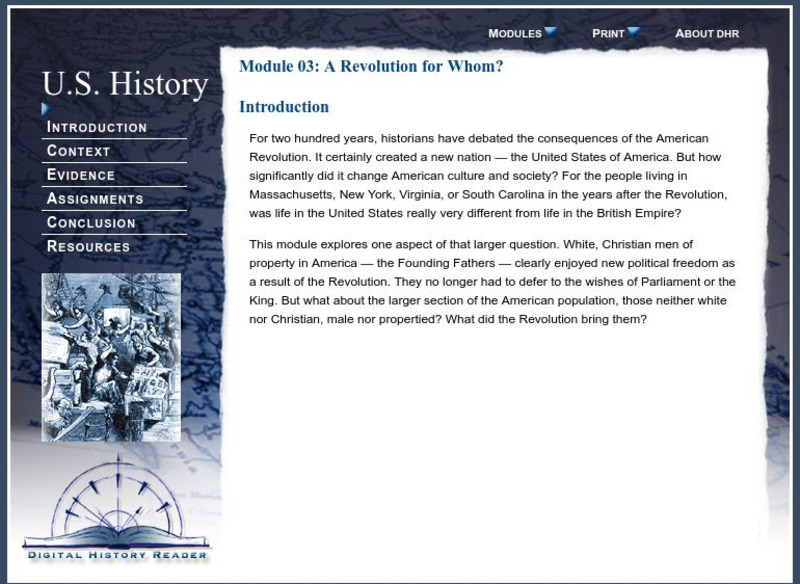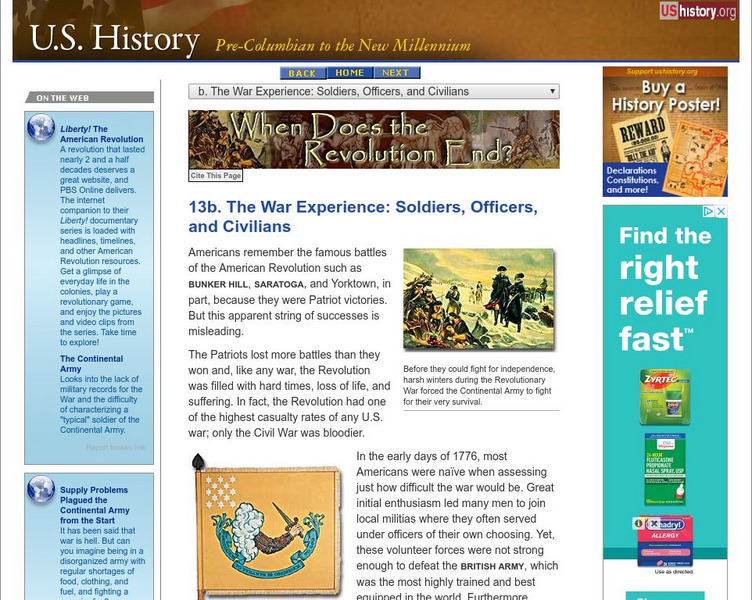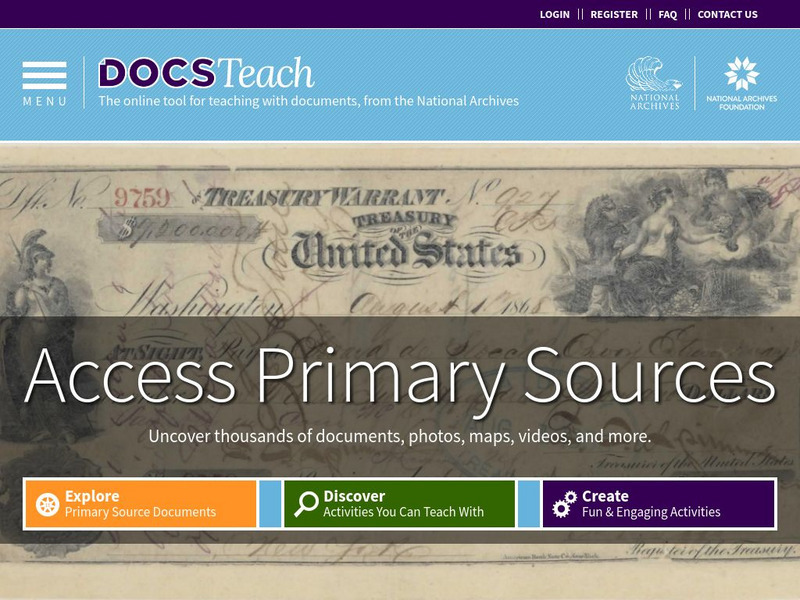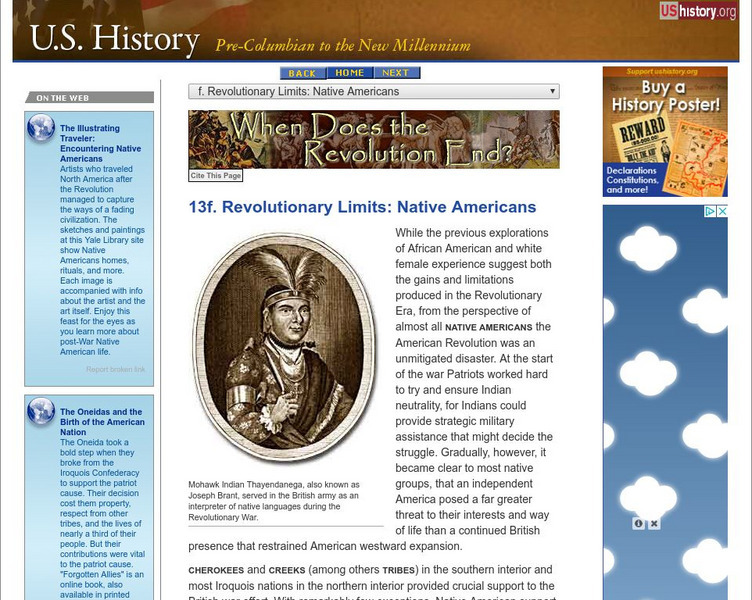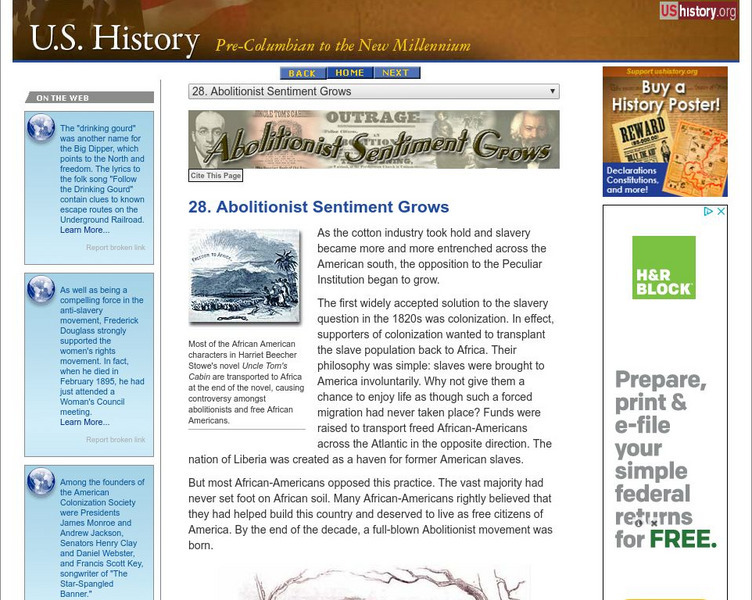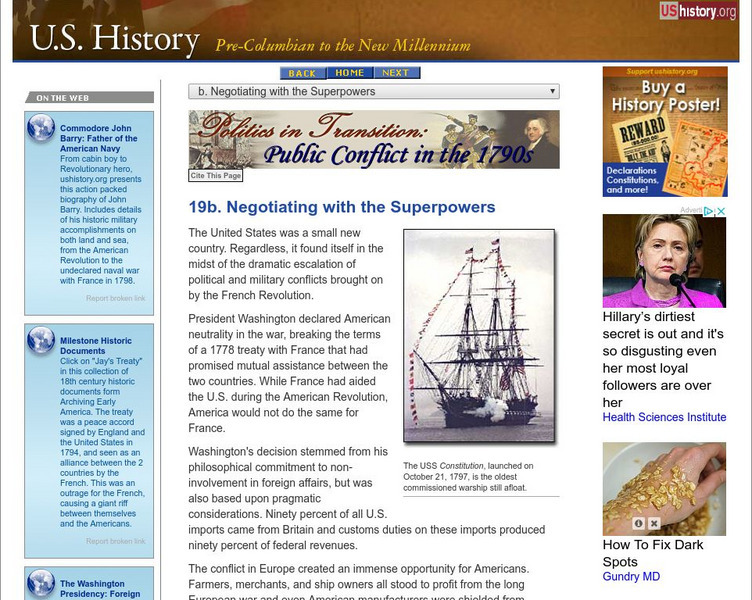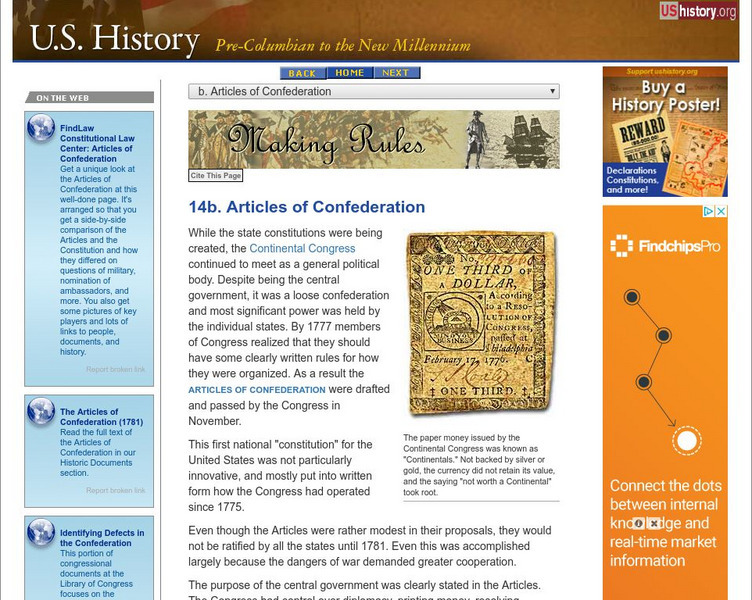Khan Academy
Khan Academy: Us History: 1754 1800: Unit Test
Take this eleven question unit test over US history during the period of 1754 and 1800.
Khan Academy
Khan Academy: Us History: 1754 1800: The Constitutional Convention
Shortly after the end of the Revolutionary War, American leaders realized that the nation needed a new, stronger Constitution. But what would the new system of government look like?
Smithsonian Institution
National Museum of American History: The Price of Freedom: Americans at War
View comprehensive sets of artifacts that tell the story of America's wartime past and present. Artifacts from every major American military conflict, beginning with the American Revolution, can be closely examined. Full curatorial notes...
Virginia Tech
Digital History Reader: u.s. History: A Revolution for Whom?
A module that addresses what changes in America came about as a result of the Revolutionary War. Who was impacted? How? Did it improve life in the new nation? Dive into the details of the changes through a collection of articles and...
Independence Hall Association
U.s. History: The War Experience: Soldiers, Officers, and Civiliams
It's a miracle American won the American Revolution. Read about the difficulty in raising and maintaining a professional fighting force. Also find out about the antagonism between the soldiers and civilians. Congress seemed unwilling to...
Raleigh Charter High School
Mrs. Newmark's Page: The Revolutionary War
Seventeen question multiple-choice exercise is immediately scored and checks your understanding of the Revolutionary War.
Khan Academy
Khan Academy: The Seven Years' War (French and Indian War) Pontiac's Uprising
An overview of the Seven Years' War (French and Indian War) and how Pontiac's Uprising influenced the Revolutionary War.
Independence Hall Association
U.s. History: American Revolution: American and British Strengths and Weaknesses
Read a brief overview of the strengths and weaknesses of both the Americans and British in the Revolutionary War. How could such a well-funded, militarily strong country be defeated by a former colony, one with no money, little military...
Independence Hall Association
U.s. History: The Revolution on the Home Front
War is not confined to the battlefield. The economic consequences were great for the Americans during the Revolutionary War. Find out about what British occupation meant, and how women stepped up to keep the economy going while the men...
Independence Hall Association
U.s. History: The American Revolution
A brief overview of the battles and their individual and collective importance in the Revolutionary War. Find out about the battle that turned the tide and brought about needed French assistance.
Independence Hall Association
U.s. History: Yorktown and the Treaty of Paris
Read about the siege of Yorktown and the inability of Cornwallis to be resupplied, resulting in his surrender of 8,000 British troops to General George Washington. The end of the Revolutionary War was finalized with the Treaty of Paris...
Khan Academy
Khan Academy: Us History: 1754 1800: Lexington and Concord
AN overview of the Battles of Lexington and Concord.
Khan Academy
Khan Academy: Us History: 1754 1800: Women in the American Revolution
Women supported the American Revolution by making homespun cloth, working to produce goods and services to help the army, and even serving as spies.
Khan Academy
Khan Academy: Us History: 1754 1800: The American Revolution
A quick comprehension check over the American Revolution.
Independence Hall Association
U.s. History: Revolutionary Changes and Limitations: Slavery
See how the conflicting ideas of land ownership and person ownership flew in the face of the principles of the Declaration of Independence and the ideals of the Revolutionary War.
PBS
Wnet: Thirteen: Freedom: A History of Us: Revolution Webisode 2
Webisode 2 - Revolution. The history of the United States is presented in a series of webisodes, within each are a number of segments. Included are links to lesson plans, teacher guides, resources, activities, and tools.
US National Archives
National Archives: Bring History to Life
How can you actually bring history to life? Here are some tools from the National Archives that allow students to create their own projects using primary-source based activities that develop historical thinking skills. Special historical...
Independence Hall Association
U.s. History: Revolutionary Limits: Native Americans
A good description of the actions and fate of the Native Americans who allied with the British to fight against the Americans. Find out that while the Native Americans had treaties with the British, they were not represented at the talks...
Independence Hall Association
U.s. History: Loyalists, Fence Sitters, and Patriots
Read about the war of propaganda the Patriots needed to wage in order to persuade the vast majority of Americans, who were at first ambivalent to the cause of independence, to support the ideals of the Revolutionary War.
Independence Hall Association
U.s. History: Revolutionary Changes and Limitations: Women
Often the ideal and reality do not conincide for quite some time. That's true of the ideal of true equality between the sexes after the War for Independence. See why the end of the war did not bring indepence for married women, and why...
Smithsonian Institution
National Museum of American History: Within These Walls
Two hundred years' worth of American history all in one house. Learn what a close examination of a single-family dwelling can tell us about what life was like during five different periods of American history: the colonial era, the...
Independence Hall Association
U.s. History: Abolitionist Sentiment Grows
Abolitionists had been active since the end of the Revolutionary War, but in the 1830s they became more radical in their demands to end slavery. See what their solutions were, and read about how abolitionist views were thwarted in the...
Independence Hall Association
U.s. History: Negotiating With the Superpowers
Read about the problems President George Washington had with foreign affairs. Both France and Great Britain ignored American sovereignty and claims of neutrality. Read about Great Britain's disregard of the Treaty of Paris which ended...
Independence Hall Association
U.s. History: Articles of Confederation
During the Revolutionary War, it was necessary to put together some sort of central government, primarily to raise and pay an army. Read about the rules finally passed by Congress in 1777, called the Articles of Confederation. See what...



